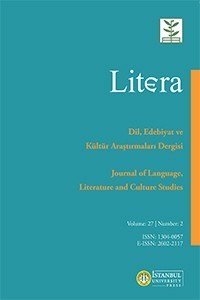Tracing Gender in The Rock of Tanios in the Context of Feminist Literary Criticism
Tracing Gender in The Rock of Tanios in the Context of Feminist Literary Criticism
Amin Maalouf was born in Beirut and is considered one of today’s most important writers for his essays dealing with the social issues of our time, particularly his novels based on his family biography. Maalouf discusses different periods within the framework of phenomena such as immigration, war, exile, love, and identity while constructing the sociocultural and historical realities of the Orient in his novels. Historical realities and individual tragedies emerged at the center of social changes in the bridge between East and West, and research on Maalouf’s works converge with existentialism, with the protagonists of his novels being represented through social relations dominated by this philosophy. Gender analysis occupies an important place among these relations and appears alongside various other issues in many of his works, from On Identity to The Rock of Tanios and Samarcand. Maalouf received the Goncourt Prize for The Rock of Tanios, which can be considered one of the works that bears the traces of its genre. Throughout the novel, one easily notices the female characters’ passive roles and the activeness of male characters in the production of power. In this sense, the work deserves to be analyzed in terms of gender in the context of feminist literary criticism. This article will deal with The Rock of Tanios in light of gender analyses and open up a discussion to question the fictional creation of female reality and the characterization of its existence in this work.
___
- Aktaş, G. (2013). Feminist söylemler bağlamında kadın kimliği: Erkek egemen bir toplumda kadın olmak. Hacettepe Üniversitesi Edebiyat Fakültesi Dergisi, 30 (1), 53-72. google scholar
- Bahrani, Z. (2018). Babil’in kadınları. Mezopotamya’da toplumsal cinsiyet ve temsil. (S. Çalcı, Çev.). İstanbul: Kolektif. google scholar
- Bauman, Z, Donskis L. (2020). Ahlaki körlük (A. E. Pilgir, Çev.). İstanbul: Ayrıntı. google scholar
- Bauman, Z. (2021). Sosyoloji ne işe yarar? (A. E. Pilgir, Çev.). (2.bs.). İstanbul : Ayrıntı. google scholar
- Bourdieu, P. (2002). Questions de sociologie. Paris: Les Editions de Minut. google scholar
- Cakeljic, V. R. (2018). La feminite du monde dans Le premier siecle apres Beatrice d'Amin Maalouf. Filolog, 17, 429442. google scholar
- de Beauvoir, S. (1998). Le deuxieme sexe II. Paris: Gallimard. google scholar
- de Beauvoir, S. (2000). La femme rompue. Paris: Folio. google scholar
- de Beauvoir, S. (2008). Memoires d’une jeune fille rangee Paris : Folio. google scholar
- Doğan, S. (2020). Toplumsal cinsiyet bağlamında Buket Uzuner’in kurmaca eserlerinde gelenek ve kadın. Kesit Akademi Dergisi, 6 (25), 727-740. google scholar
- Gördebil, M. (2019). Amin Maalouf’un Tanios Kayası adlı romanının teknik ve tematik açıdan incelenmesi. Istanbul Journal of Arabic Studies, 2 (2), 181-218. google scholar
- Güneş, F. (2017). Feminist kuramda ataerki tartışmaları üzerine eleştirel bir inceleme. Fırat Üniversitesi Sosyal Bilimler Dergisi, 27 (2), 245-256. google scholar
- Humm, M. (2002). Feminist edebiyat eleştirisi. (G. Bakay, Yay. Haz.). (Ö. Altay, G. Bakay vd. Çev.). İstanbul: Say. google scholar
- Karadeniz, H. (2019). Feminist edebiyat eleştirisi ve Hatice Bilen Buğra’nın Mal Sahibi adlı hikâyesinin incelenmesi. Ahi Evren Üniversitesi Sosyal Bilimler Enstitüsü Dergisi, 5 (2), 284-298. google scholar
- Korkmaz, A., Başer, M. (2019). Toplumsal cinsiyet rolleri bağlamında ataerkillik ve iktidar ilişkileri. Sürekli Tıp Eğitimi Dergisi, 28 (1), 71-76. google scholar
- Kraenker, S. (2009). Des ecrivains a l’identite hybride, representants d’une litterature-monde d’aujourd’hui et de demain: Karin Bernfeld, Nina Bouraoui, Assia Djebar, Amin Maalouf, Wajdi Mouawad. Synergies Pays Riverains de la Baltique, 6, 219-227. google scholar
- Küçükler Kuşçu, N. (2022). Feminist edebiyat örneği olarak Füg. Akademik Dil ve Edebiyat Dergisi, 6 (4), 1208-1221. google scholar
- Maalouf, A. (1988). Samarcande. Paris : Lattes. google scholar
- Maalouf, A. (1992). Le premier siecle apres Beatrice. Paris : Grasset. google scholar
- Maalouf, A. (1994). Le rocher de Tanios. Paris : Grasset. google scholar
- Maalouf, A. (1996). Les echelles du levant. Paris : Grasset. google scholar
- Maalouf, A. (1999). Les identites meurtrieres. Paris : Grasset. google scholar
- Maalouf, A. (2001). L’amour de loin. Paris : Grasset. google scholar
- Maalouf, A. (2004). Origines. Paris : Grasset. google scholar
- Marteinson, P. (2005). La disjonction de la voix narrative et la manipulation de la vraisemblance dans «Le Rocher de Tanios» d’Amin Maalouf. Journal of Arabic & Islamic Studies, 6, 80-94. google scholar
- Mimouni, L. D. (2007). Le premier siecle apres Beatrice de Amin Maalouf : roman de science fiction ? İnsaniyet, 38, 73-89. google scholar
- Saraçgil, A. (2005). Bukalemun erkek. İstanbul : İletişim. google scholar
- Soyer, S. (2017). İki kadın bir feminizm. İstanbul : Net Kitaplık. google scholar
- Steiciuc, E. B. (2020). L’ecrivain francophone Amin Maalouf et la restitution transculturelle/transtextuelledes ecrits anciens. Meridian Critic, 1, 27-34. google scholar
- Şeker, A. (2021). Kadın roman kahramanları. Ankara : Nika. google scholar
- Ulu, A. (2021). Feminist edebiyat eleştirisi bağlamında yeniden yazım: Lavinia örneği. Akdeniz Kadın Çalışmaları Toplumsal Cinsiyet Dergisi, 4 (1), 35-62. google scholar
- Başlangıç: 1954
- Yayıncı: İstanbul Üniversitesi
Sayıdaki Diğer Makaleler
The Anti-Speciesist Stance in J. M. Coetzee’s Novels: An Analysis of Animal-Standpoint
A Micrology of Pattern Recognition in Philip K. Dick’s A Scanner Darkly
Max Aub, a Body in Transit in a Lost Time: Reflections and Thoughts on Exile in His Works
Tracing Gender in The Rock of Tanios in the Context of Feminist Literary Criticism
Orpheus and Eurydice Revisited: Grief and Grieving in Zinnie Harris’ Meet Me at Dawn
Vibrant Matter, Actants and the Limits of Human Agency in Saramago’s The Stone Raft
Collecting and Destroying Postcards: Discursive Travel in Lynne Tillman’s Motion Sickness
The Spectre and the Pin: Trompe-l’oeil and Hermeneutic Mourning in Hamnet
Mythopoeic Image of the City in T. S. Eliot’s The Waste Land
